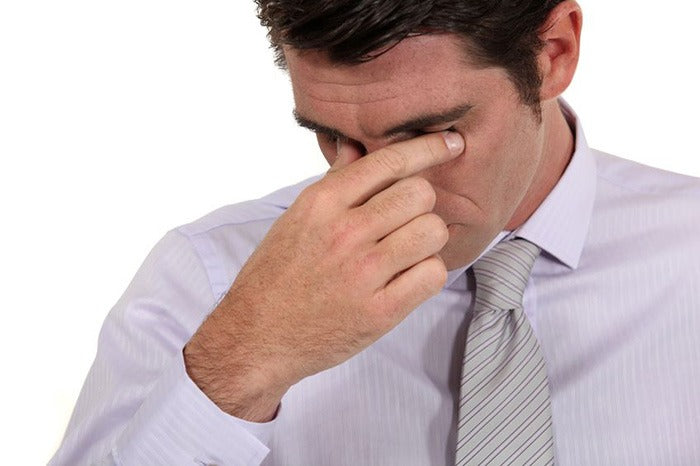800-576-7616

5 Natural Remedies for Sinus Headaches
The throbbing in your temples, like the banging of a drum. The pressure behind your eyes, your head, and even your cheekbones. Aching even in your teeth. And let’s not forget the tightness in the back of your neck that sometimes extends into your shoulders.
Ah yes, it is another full-blown sinus headache. (Or is it?)
Is it a sinus headache or migraine?
When your head hurts, it can be difficult to think about why it is happening. All you know is that you want it to stop. However, knowing the source of the pain goes a long way in identifying an effective treatment.
According to the American Migraine Foundation, people who self-diagnose sinus headaches are wrong a whopping 90 percent of the time. You thought the tell-tale pressure in your forehead and sinuses were clear signs of a sinus headache. Yeah, no. Migraine is associated with all those same symptoms. Even a runny nose can be caused by a migraine and not your sinuses.
So how can you tell if it actually might be a migraine? Look for other migraine related symptoms. For example, are you experiencing nausea and vomiting, sensitivity to light and sound, and/or throbbing pain that is isolated on one side of the head? When those are part of the equation, then you are dealing with a migraine.
Then what is a true sinus headache?
Your sinuses are air-filled sacs that connect to each side of your nose. It is their job to clean the air you inhale through your nostrils. A complex network of sinus cavities winds through your forehead, cheekbones, and behind the bridge of your nose.
Many medical experts agree that sinus headaches are rare and reserved for a minority of people diagnosed with acute frontal sinusitis or sphenoiditis.
If you do have a true sinus headache, then you must have an infection somewhere in your sinus cavities. In this case, you’ll have fever and congestion. It is that congestion that produces the horrible pressure in your sinuses. And the fever is what makes you feel generally unwell.
How do doctors treat a sinus headache?
Doctors usually recommend starting with an over-the-counter decongestant and pain reliever. Nasal irrigation also can help. The procedure involves slowly pouring a saline solution into one nostril and allowing it to flow through the nasal cavity and out the other nostril. Nasal irrigation can help wash out mucus and drain some of your congestion.
If these methods do not make you feel better within a few days with, your doctor may prescribe an antibiotic or nasal steroid to treat the underlying infection. Medical practitioners do their best to avoid unnecessarily prescribing steroids to prevent antimicrobial resistance.
Natural sinus headache remedies
Some people prefer to go the natural route when treating a sinus headache. Most herbal solutions for nasal pain and congestion work by helping to prevent an infection (rather than curing an existing infection). So the goal should be five lifestyle changes that can help keep an infection from developing – and prevent what feels like your next sinus headache.
-
Hydrate
Drinking plenty of water throughout the day is good for your overall health. Staying hydrated helps keep your skin, hair, and nails supple and ensures optimal functioning of your internal organs. Did you know that water also moisturizes your sinuses and helps your body flush out toxins that can increase your chances of a future sinus infection? Hydrating keeps your mucus thin and loose, making it more likely to drain. -
Elevate
Sleeping flat on your back is a recipe for disaster (and will certainly do nothing to help your sinuses drain). Lying flat increases mucus buildup in your nasal passages which can cause sinus pressure to build. Prop your head up with pillows at night to prevent sinus pressure and pain. Make sure your head is higher than your heart for the best results. -
Use a humidifier
When your sinuses dry out, it can trigger uncomfortable symptoms like headache and sinus pain and pressure. Dry sinuses do not produce enough mucus. There is a fine balance between too much mucus and not enough. When your sinuses dry out (not enough mucus), the nasal passage tissues become inflamed and irritated. Using a humidifier in your bedroom at night can help keep your sinuses moist. If you find your entire house or office is too dry during the day, run a humidifier in the room you spend the most time in to provide ongoing relief. -
Try essential oils
Essential oils have many benefits. Peppermint and lavender are among the two essential oils that can provide relief from sinus headaches. You can massage a few drops directly to your forehead, temples, and back of the neck before bed. Some people prefer to blend peppermint or lavender with eucalyptus oil to help encourage easier breathing. If you do not want to mess with mixing essential oils, you can use a product like Headache ReLeaf Roll-On. It blends essential oils and menthol with purified water for a simple, yet effective, natural sinus headache remedy. Gently roll it over the areas that hurt, and you will experience relief in a few minutes. -
Cleanse your nasal passages
Daily nasal washing can help keep your sinuses clear of allergens and other irritants. This lowers your risk for future infection. Neti Pots are one way to perform nasal irrigation and make the process super easy. You also can purchase nasal rinses you spray up your nose in virtually any drug store.
A final word on natural relief for sinus headaches... There is never any reason to sit and suffer from sinus pain and pressure. Using these preventative natural remedies can help head off trouble before it starts.

